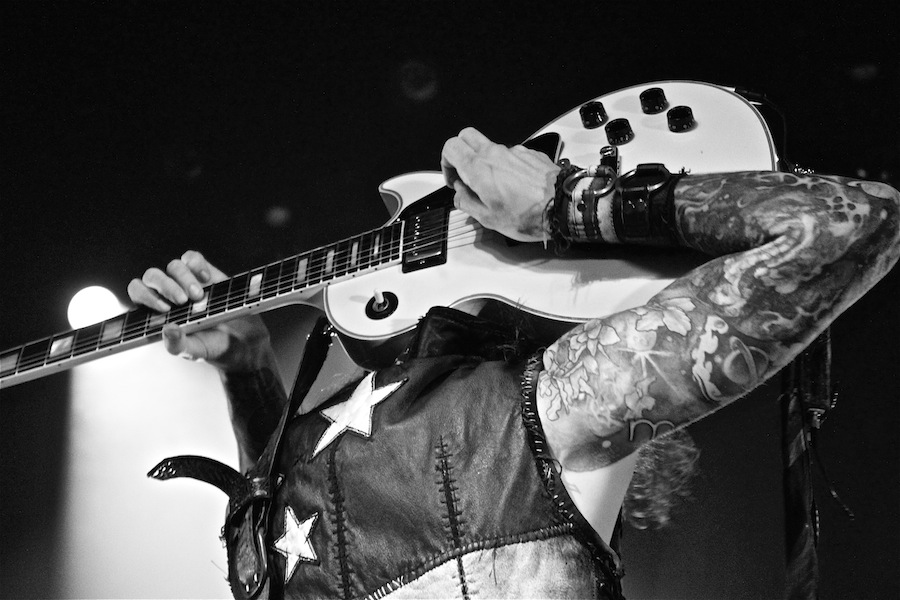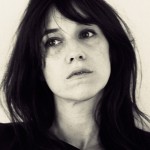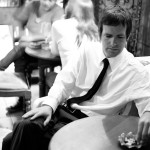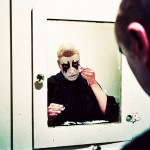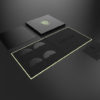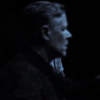Photos by Andrew Parks
Words by Arye Dworken
Even now–nearly a decade after their breakthrough single “I Believe in a Thing Called Love”–it’s hard to know where The Darkness lands on the ironic rock ‘n’ roll scale. Is the British band just one elaborate art project? Or is the Suffolk foursome better suited touring alongside Def Leppard, just as they did a few years back, and opening for Lady Gaga, as they will this coming fall? More importantly, are fans laughing at or with them now that their first album in six years (Hot Cakes) is finally out? Somewhere, in some university (probably in Poland), there’s a grad student writing a thesis on all of this. Because while the Darkness are rarely taken seriously, this is not to mean they are not very serious about whatever it is they’re doing.
Justin Hawkins, a long-haired frontman currently sporting pirate-like facial hair, shows up to our interview in red spandex suit that summons the spirit of Rob Halford and Thriller-era Michael Jackson. It is a hot sweltering summer day in Midtown Manhattan, and no, we are not backstage at a rock venue. We are in a corporate office of the Darkness’ new label, Wind-Up. Our backdrop is a room full of grey cubicles. It takes a certain, or as some would say, absurd level of commitment to live as a Certified Rock Starâ„¢ 24/7 in 2012 when, as Hawkins points out during our interview, such things are shunned and belittled as feeling retro and out-of-fashion. But the band’s renewed devotion to the rock ‘n’ roll dream, after public in-fighting and an eventual combustion, is admirable and palpable. And despite the half-decade that’s passed since their sophomore release One Way Ticket to Hell…, the Darkness’ is now reasserting their mission statement to make rock ‘n’ roll sound fun again. (Did we mention that the cover of Hot Cakes shows three scantily clad women lying on top a giant pancake with poured maple syrup all over them? Well it does.)
That is an amazing outfit. Do you ever just throw on a T-shirt and jeans to grab a carton of milk?
Justin Hawkins:I don’t drink milk. [Laughs]
Is that leather?
JH: Actually, it’s spandex, painted. But when I perform live, I do wear leather.
The first time I saw you was at the Bowery Ballroom; I think it was even the first U.S. show for the Darkness. But then after promoting the first record, you didn’t tour the U.S. for the second record…
JH: Well, everyone at our label got sacked, and it became a political minefield. It was very hard to justify coming back to the country when the label itself was a mess.
Do you regret not coming back? Do you think that was in some part responsible for America falling out of touch with the Darkness?
JH: I don’t regret it, no. And I think the magic was waning at that point. I don’t think that we were that enthusiastic about being in a band.
Were you aware of the reaction to the second album reviews?
JH: You know, the first record had mixed reviews. It wasn’t like it was a unanimously praised record. I think the second album may have been reviewed better. But because of the fact that it didn’t sell so well, people think it wasn’t reviewed well.
I think One Way… had a strong sense of humor about it.
JH: Yeah, but I think that people got uncomfortable with the humor. Like we were overstepping the line. We have a philosophy to write songs about things no one else has written about. Like “Bald” or “Black Shuck.”
Was that the approach on Hot Cakes?
It’s a lot more heartfelt than the second one. The bits that are moody are moody for a reason. I think it’s more from the heart.
Did you keep in touch with one another when you were on hiatus?
JH: Not for the first bit. No.
Ed Graham (drums): There wasn’t a huge animosity.
JH: I had to make some fairly dramatic lifestyle changes. And I lost a lot of friends with that. The people that I misbehaved with…I had to leave them behind. It was kind of like baby with the bathwater. I know a lot of people in the same situation as me and they have not succeeded in maintaining the life I am living now. I believe that if you’re going to stop something damaging to your existence, you can’t just white knuckle it.
What’s like being on stage completely sober? As a full energy frontman, is there a difference now?
JH: Um, I think I’m more a frontman now. What I feed off of, and what I get a kick out of, is completely surrendering to the performance. It’s the focus of my day. My whole day is eating properly, exercising, training to be a performer. And the show is my release. It’s not 100-percent my life now.
How important is it for a band to be supportive of one another, to maintain this trajectory of being a sober and functional band?
JH: We all have expectations of one another and sometimes that manifests in a judgmental way.
EG: The standards are higher.
JH: Everything has been done in a sober phase. It’s been six years so maybe we’re used to the process now.
I think the new record is way more personal than your first two records specifically “Living Each Day Blind.”
JH: I’m glad you’ve said that. Because that is one of the moments of the record that is very personal. It’s about losing sight of what’s important, about losing control…it’s a small town song. I moved back to my small town. I lived in London for quite a while and lost a lot of that small town guy who lived inside of me. The first record was all from the perspective of that person and having lost that…I wanted it back. What I got a kick out of…that were tiny micro-cultural themes that a small group of people could relate to in a special way. I think that that could also create an ownership of the band, the record, a close and personal relationship.
EG: I was also in London for 12 years, and I also moved back to focus on the band.
What’s like being back in a small town and being the Darkness? I mean, surely, everyone knows who you are.
EG: We’re away on tour a lot so I moved in with my parents. I can’t do that any more because it wound up being months. I found my own flat but in terms of lifestyle, it’s less crazy, no temptations. It’s a more interesting atmosphere but on a different scale.
It seems like the Darkness has gone through so much in a decade. It’s almost the cliche rock story about drugs, women, break-ups, reunions…and all of this happened in a span of 10 years.
JH: It is strange to think that it’s only been ten years ago…one way or another, we would have always had to take a break. We should have done that in-between the first two records.
Why did the second record cost so much? The cost is almost legendary.
JH: We came up with everything in the studio. We didn’t write things and road test them. We sat around and wrote stuff and threw some away and wrote some more.
I was surprised by that because [noted Queen producer] Roy Thomas Baker produced the album, yet there were no epic seven-minute suites.
JH: He discouraged it. He wanted to hear more riffs. He also did some Cars records and that was super simple. But also as we got into it, we knew it was a once in a lifetime opportunity. The industry was changing and we knew that no one was going to make expensive albums any more so why not take advantage of that?
Everyone mentions the pan flute on the album. There’s almost a disdain for it.
JH: I had this part, and it was ludicrous and self-indulgent but also fun. We tried to find the ultimate sound for it and I tried all different things like a bunch of synthesizers but the pan flute was the best option. A guy like Roy though wants to get the pan flutist from Peru, and we had to build a custom pan flute…when you’re working with Roy Thomas Baker, your whims become a very expensive reality.
The Darkness decided to do the comeback yourself. There was no Rick Rubin collaboration. There was no prominent guest appearances. A very understated return for a band not known for understatements.
JH: We didn’t feel like anyone knew us like we knew ourselves. We always felt that when we second guess what the appeal is, we don’t understand what it is that the fans like about us.
What would be the confusion?
JH: Some people would say it’s the glam element; some people say it reminds them them of the ’80s; some people say that it reminds them about the ’70s. I think the Darkness can function on many different levels for many different people. It gets confusing when you start understanding them all.
When you meet someone, do you get a sense of whether they’re appreciating the band sincerely or ironically?
JH: Yeah. Absolutely. I find myself assessing that…but it only happens with positive feedback. With positive feedback, you think, well, where’s that coming from?
You seem a bit accommodating, no matter where the interest is coming from?
JH: Really? I don’t know. There got to a point where people all asked the same questions like the first album, it was about catsuits. For the second album, it was about drugs.
You did an interview with Spin a few months back and I was very impressed with your forthrightness.
JH: Some of those questions were really harsh. One question was about whether my life itself was an artistic statement or not.
And you said you couldn’t tell yet. You wouldn’t be sure until the end came.
JH: On the one hand, I was really disappointed that someone had asked me that but on the other hand, I’m happy that I had to address it. Because honestly I don’t even know myself any more. But the whole point of being a “rock star” is that you have to surrender to it. It becomes a part of your whole being. One of the things we were fighting at that time when we started was that people were getting up on stage as the boy next door in jeans and an anorak and just singing humbly. We wanted a mystique, an other worldliness, and catsuits. That stuff was important to me. It may have hurt our credibility in certain scenes, but we wanted that.
Have you heard from anyone in Radiohead about your cover of “Street Spirit?”
JH: No, not yet. They’ve contributed enough to music to do whatever they want to do. I admire that. Their audience can change and become more selective but that won’t matter to them. They’ll always do whatever it they do.
Do you envy a band that has such a definitive vision that they know what they are and that’s it?
JH: In a way, I feel bad for bands that know what they are. It’s like a marriage with a boring sex life. I would hate that. For me. When we’re not working, we don’t hang out together that much. There’s tension, there’s discovery, and there’s magic. It happens every night live. It may be subtlety different but when we’re in the moment, there’s an unknowing.
You’re touring with Lady Gaga very soon and I think that makes total sense.
[Hawkins gets up and high-fives me]
Well, I think you’re both provocateurs, and no one’s sure of intention. Is it an art project, is it about infiltration? Is is a sincere expression or an elaborate statement?
JH: You know, you and I are just about the only ones who thinks it makes sense. When we got the phone call to open for her, my reaction was, ‘At last!’ And I knew she was aware of me because of my Adam Lambert contribution.
I wonder how this tour will play out. How will her fans react to you?
JH: This is the first time though that I’m not nervous about supporting a band. And we’ve done everybody. Def Leppard, Rolling Stones, Metallica, White Snake, Wildhearts, Disturbed, Robbie Williams…
Wow. That’s quite the gamut…so having not done this for so long, are you nervous about the tour? What can you do to maintain the peace?
JH: I love the touring life. It’s the sort of thing that has more of a routine that even being at home. I do whatever I feel like at home and it’s just too much to think about. But being on the road feels structured. It sounds very not rock star-ish but it keeps us focused and out of trouble.
–
Check out our full set of Darkness photos here.
